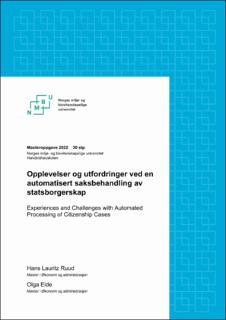| dc.contributor.advisor | Levay, Charlotta | |
| dc.contributor.author | Ruud, Hans Lauritz | |
| dc.contributor.author | Eide, Olga | |
| dc.coverage.spatial | Norway | en_US |
| dc.date.accessioned | 2022-12-12T09:34:44Z | |
| dc.date.available | 2022-12-12T09:34:44Z | |
| dc.date.issued | 2022 | |
| dc.identifier.uri | https://hdl.handle.net/11250/3037171 | |
| dc.description.abstract | UDIs oppgave er å ivareta og iverksette Norges flyktnings- og innvandringspolitikk, og de håndterer blant annet søknader om statsborgerskap. Dette arbeidet er krevende og har ført til behov for et mer effektivt saksbehandlingssystem. Høsten 2020 implementerte UDI derfor et automatisert system kalt UMA for å effektivisere deler av prosessene. I tillegg ble loven om dobbelt statsborgerskap innført samme år, hvilket har økt søknadsmassen og akselerert nødvendigheten for et slikt system betraktelig.
Formålet med denne oppgaven er å beskrive og analysere oppfatninger og utfordringer i ansattes arbeidshverdag knyttet til bruken av UMA. Gjennom undersøkelser hos saksbehandlere i UDI, har vi belyst noen av konsekvensene automatiserte systemer kan medføre. Datagrunnlaget for oppgaven er basert på to kvalitative metoder samt relevant teori og forskning av lignende automatiseringsløsninger. Det viser seg å være få studier med fokus på ansattes reaksjoner rundt automatisering i offentlig sektor. Oppgaven er derfor også relevant for andre offentlige etater enn UDI, samt for videre forskning.
Faktorer som studeres, er endringer i arbeidshverdagen, utfordringer som har oppstått, og hva ansatte tror om automatisering på sikt. Resultatene våre tilsier at saksbehandlerne i UDI er svært fornøyde med den automatiserte løsningen siden de frigjøres fra enkle rutineoppgaver. På den måten kan det fokuseres på oppgaver som krever en høyere grad av menneskelig interaksjon. Oppgaven belyser også utfordringer knyttet til graden av ansvar og tillit til automatiserte systemer som UMA, og drøfter virkningen det kan ha på kvalitet i arbeidet, kompetanseutvikling og engasjement hos de ansatte. | en_US |
| dc.description.abstract | UDI’s primary responsibility is to take care of and implement a refugee and immigration policy in Norway, including processing citizenship cases. This work is challenging and has led to the requirement of a more efficient case processing system. Therefore, in fall 2020, UDI implemented an automated system called UMA to streamline parts of the process. The introduction of the law of dual citizenship the same year resulted in an increased number of applications and accelerated the demand for such a system considerably.
The purpose of the thesis is to examine and analyze employees' perceptions and challenges related to automated solutions. We have identified several consequences and implications caused by UMA by studying caseworkers at UDI. Two qualitative data gathering methods, including relevant theory and research on similar automation solutions, form the foundation of this thesis. However, few papers focus on employees’ reactions to automation initiatives in the public sector. Our thesis is therefore relevant for both other public institutions and the research community.
This thesis studies changes and challenges in the employees’ everyday work, and how they view the role of automation in the long run. In short, our results indicate that the case workers at UDI are satisfied with UMA handling the simpler and repetitive tasks. This enables them to focus on the tasks that require a higher degree of human interaction. This thesis does also evaluate challenges related to responsibility and trust in automated systems, and discusses the effect this can have on quality of work, competence development and engagement amongst the employees. | en_US |
| dc.language.iso | nob | en_US |
| dc.publisher | Norwegian University of Life Sciences, Ås | en_US |
| dc.rights | Attribution-NonCommercial-NoDerivatives 4.0 Internasjonal | * |
| dc.rights | Attribution-NonCommercial-NoDerivatives 4.0 Internasjonal | * |
| dc.rights.uri | http://creativecommons.org/licenses/by-nc-nd/4.0/deed.no | * |
| dc.title | Opplevelser og utfordringer ved en automatisert saksbehandling av statsborgerskap | en_US |
| dc.title.alternative | Experiences and challenges with automated processing of citizenship cases | en_US |
| dc.type | Master thesis | en_US |
| dc.description.localcode | M-ØA | en_US |

